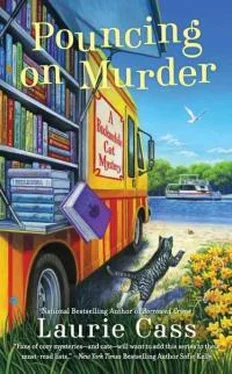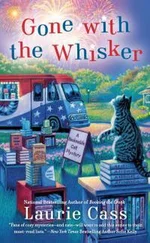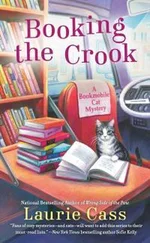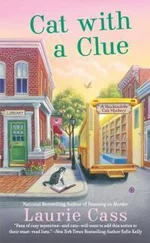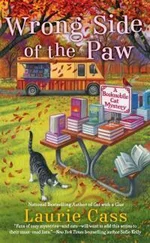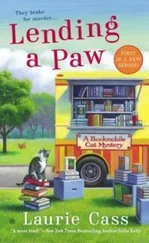I wished him and his brothers the best and hung up, hoping that Felix wouldn’t be able to convince them differently. Money was a smooth talker, and the lure of making maple syrup might not hold up against the lure of a lot of zeros on a check.
• • •
“What do you think, Eddie?”
My cat, who was still on top of the palm tree, opened his eyes a small fraction, then closed them again.
“So you’re saying you don’t want to go outside for a walk with me?”
As I spoke a gust of wind buffeted the window. Though I didn’t exactly see the glass flex under the wind’s pressure, it probably should have.
Eddie jumped to the floor and made a beeline for my closet. I followed him and found him wedged into the closet’s back corner, wrapped around my rain boots. “You are the weirdest cat ever,” I told him.
He burrowed his head deeper toward the bottom of the closet and didn’t say a thing.
“Have a good nap, my fuzzy friend.” I packed my backpack with cell phone, wallet, and a couple of books because you just never know, pulled on my raincoat, and headed out into the wild weather.
Outside, another buffet of wind almost made me change my mind, but I knew it would do me good to get out and do something, even if it was just driving around. And I could even do something marginally useful, such as check out possible bookmobile routes. I never took the bookmobile down a road without vetting it first with my car—what looked fine on a map had the potential of being problematic for a large, tall, thirty-one-foot-long vehicle with the turning radius of a semi-truck.
I pointed the front bumper of my car south and east of Chilson, and a dozen miles later, once I got around the east end of Janay Lake, I headed straight south to farm country. There were roads down here I’d never driven, and who knew what fun things I might see?
There were all sorts of possibilities, really. Barns with murals painted on their sides. Fences made from stacks of fieldstones. Garages made of hundreds of short pieces of wood stuck together with concrete. Wide vistas of hills and woods and lakes and sky. Deer. Turkeys. Grouse. Woodpeckers. Bald eagles. Black bears, even, and I’d heard rumors of mountain lions, which seemed unlikely but you never knew.
Though it was still windy, the rain had stopped. I pushed in a CD of a Canadian group, the Bare Naked Ladies, and was happily humming along about having a million dollars, enjoying the countryside that was starting to fuzz with green, when the rattletrap pickup that had been a couple of hundred yards ahead of me for the last few miles took a left turn.
“That’s Mitchell’s truck,” I said out loud. Mostly trucks all looked alike to me, but Mitchell’s had the unusual attribute of having one color for the bed, another for the body, another for the hood, and yet one more for the passenger’s door.
For no other reason than sheer curiosity, I decided to follow him. Maybe I’d figure out why he was acting so oddly. A weird Mitchell was acceptable and even desired, but Mitchell’s current weirdness was so out of the ordinary that it needed explanation.
At least that was what I told myself as I followed him onto a narrow gravel road. Far ahead, I watched the back end of his truck run over the ruts and potholes at a much faster speed than I dared push my little sedan. The only thing I knew about oil pans was that they lived on the bottom of vehicles and were a bad thing to thump upon.
My teeth chattered together as my car bounced down the road. Every so often I’d wince in preparation of a pothole too big to go around and sigh in relief when the hole didn’t suck me in forever.
It wasn’t long before I lost sight of Mitchell altogether. While the number of road crossings in the last bumpy mile were zero, there had been a number of long driveways that he could have turned down and been lost to my sight.
When I reached the top of a long hill and saw no car on the road, either in front of me or behind, I knew I’d lost him. “Rats,” I said, and came to a stop. I reached into my glove box for the Tonedagana County map and opened it up.
“Huh.” If I turned around, I’d drive the same two and a half miles of rotten roads before reaching asphalt. If I kept going, I’d drive two miles of gravel road before I reached asphalt. The odds of the gravel ahead being in better condition were minimal, but at least it would be different gravel, and half a mile less was half a mile less.
I folded the map and tucked it away. “Onward,” I said, and forged ahead.
The next mile and a half of road was, if anything, worse than the road behind. It was wetter, for one thing, and mud spray soon covered the hood and spattered the windows. “Stupid weather,” I muttered.
The weather up North was, I’d found, not what you’d call predictable. It could be raining buckets down at the marina, but not raining at all a mile away at the boardinghouse. On the east side of the county, snow could be coming down at a rate that would guarantee a school closing, and the west side would get a dusting. The temperature near Lake Michigan could be ten degrees different from what it was a quarter mile inland. It was odd, but also wonderful in a weird sort of way.
I bounced down into, and up out of, a hole that wanted to swallow me whole, and when my head stopped bobbing, I saw something that made me brake to a complete stop.
Not too far from the road, parked under a tree and covered with a tarp, was a wooden boat. Back farther in the trees was a farmhouse so dilapidated that I doubted it was still being occupied.
I tapped my fingers on the steering wheel. Had this been one of the boats Adam and Henry had come across? If Adam had already rejected this one as too much work, there wasn’t much point in me getting out into the mud to take a look, but if he hadn’t, maybe this could be the boat of his dreams.
“Buck up,” I muttered. “What’s a little mud?”
I pulled the car as far off the road as I could and got out, immediately stepping into a puddle. I sighed; I’d left my rain boots in the closet because I hadn’t wanted to disturb the sleeping Eddie, and was wearing old running shoes.
But it was just a little mud and would clean off—eventually—so I kept going.
Closer to the boat, I could read the label. Hacker-Craft. The company had been building boats in New York for more than a hundred years, and every one was a beauty. Expensive, too, so it was unusual to see one in a place like this. Adam had mentioned seeing a Hacker, hadn’t he? Was that the one with the hull rot? I crouched down.
“Hey! You!”
I looked up to see a thin, white-haired woman hobbling toward me. “Oh, hello. I was just looking at your boat. I have this friend who—”
“Get away!” She lifted her hands and I belatedly realized that she was holding a long-barreled gun. “You get away right now! You’re trespassing!”
Fear jumped into my throat and I backed away. “S-sorry,” I said, holding up my hands. “I didn’t . . . I wasn’t . . .” My rear end thumped against my car and I fumbled for the door handle with one hand as I continued to hold up the other.
She pointed the gun at my feet. “Get away!” she shouted.
I fell into the car, started the engine, and got.
Chapter 10
The deputy at the front counter took lots of notes. Or he did until I got to the point where I told him exactly where I was when I’d been threatened with certain death.
“You were out on Chatham Road?” he asked. “Just north of County Road 610?”
I nodded. “Half a mile north, probably. Her house was on the east side of Chatham.”
“Uh-huh.” He put down his pen. “Hang on a second, okay?”
It wasn’t okay, but that didn’t seem to matter. The deputy left me alone in the stark lobby. I leaned against the high counter. Decided it was too high to do that comfortably. Wandered around, studying the scarred plastic chairs and decided that I didn’t want to sit in any of them. Stood looking out the tall, narrow window and decided that I didn’t like looking at the world through glass with wire mesh through it. Sighed, and stood near the counter, listening to the hum of the fluorescent light.
Читать дальше
